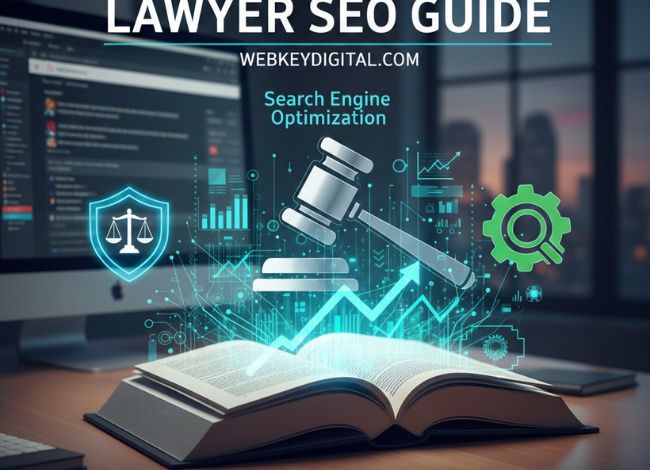Law Firm SEO Agency

Proven Track Record
Customer Satisfaction
We Have Completed
Average Answer Time
Law Firm SEO Agency

Specialization in Law Firm SEO
We do SEO for attorneys only—nothing else.
Proven Google Ranking Results
We use white-hat strategies backed by data, not guesswork.
Dedicated Legal Content Writers
We create legally accurate, conversion-focused content.
Customized Strategy for Each Practice Area
Every law firm has different goals—we tailor your plan accordingly.
How We Help Law Firms Grow
What Is Law Firm SEO?
Law Firm SEO is the strategic process of optimizing a lawyer’s website, Google Business Profile, citations, content, and authority signals to rank higher on search engines for legal keywords.
This includes:
- Optimizing practice area pages
- Building topical authority
- Improving Google Maps ranking
- Creating legal content aligned with E-E-A-T
- Acquiring authoritative backlinks
- Improving website speed & technical health
Law firm SEO helps attorneys rank for keywords like:
- “personal injury lawyer near me”
- “divorce attorney in [city]”
- “criminal defense lawyer”
- “best immigration lawyer”
When someone needs legal help, they search right now—your firm needs to appear at that moment.
Why SEO Is Critical for Attorneys
The legal industry is one of the most competitive markets on Google. Paid ads are extremely expensive, and many law firms depend heavily on SEO for long-term growth.
SEO helps law firms:
1. Rank Higher for High-Intent Legal Keywords
If your firm isn’t visible on Google’s first page, clients simply won’t find you.
2. Get More Leads Without Expensive PPC Costs
SEO brings in consistent, organic leads—without paying per click.
3. Build Online Trust & Authority (E-E-A-T)
Google favors law firms showcasing expertise, experience, and credibility.
4. Dominate Google Maps & Local Searches
Local SEO ensures your firm shows up when clients search for attorneys near them.
5. Convert More Website Visitors Into Case Consultations
A well-optimized legal website increases conversions.
Key Benefits of Attorney SEO Services
SEO targets customers ready to hire a lawyer.
SEO continues working—months and years ahead.
Better ROI than Google Ads and paid campaigns.
Top Google rankings equal trust.
Dominate searches like “lawyer near me.”
What we use
Our Law Firm SEO Process
At WebKey Digital, we take a highly strategic, data-backed approach to attorney SEO.
Our system is built on proven frameworks, NLP optimization, and competitor analysis tailored specifically for the legal industry.
Our Law Firm SEO Agency Process
We review:
Technical issues
Broken links
Crawlability
Page experience
Mobile optimization
Schema markup
Website security (SSL, ADA compliance)
This gives us a clear roadmap for boosting rankings fast.
We identify high-intent keywords for:
Personal injury
Family law
Criminal defense
Immigration
Bankruptcy
Employment law
Real estate law
Business law
Includes:
Transactional keywords, Local keywords, Long-tail keywords, Question-based keywords, NLP semantic variations.
We optimize:
GBP categories
Practice areas
Service descriptions
Local citations
Reviews strategy
Geo-tagged images
NAP consistency
This boosts your Google Maps 3-pack ranking.
We write pages that rank + convert:
Fully SEO-optimized
NLP-entity enriched
E-E-A-T focused
Legally accurate
Designed for high conversions
Examples:
Personal Injury Lawyer
Car Accident Lawyer
Divorce Attorney
Criminal Defense Lawyer
Slip and Fall Lawyer
We publish authority-building content such as:
Case guides
Legal FAQs
Statutory updates
“What to do after…” guides
Settlement calculation articles
This signals expertise to Google.
We secure backlinks from:
Legal directories
High-DA industry sites
Niche edits
Press releases
Guest posts from legal publications
Backlinks build your law firm’s authority fast.
We optimize:
Landing pages
Call-to-action placements
Case intake forms
Mobile experience
This ensures maximum lead capture.
Why Choose WebKey Digital for Law Firm SEO
✔ Specialization in Law Firm SEO
We do SEO for attorneys only—nothing else.
✔ Proven Google Ranking Results
We use white-hat strategies backed by data, not guesswork.
✔ Advanced NLP & Semantic Optimization
We use entity-based SEO to outrank competitors.
✔ Transparent Reporting Dashboard
Track rankings, leads, and traffic anytime.
✔ Dedicated Legal Content Writers
We create legally accurate, conversion-focused content.
✔ Customized Strategy for Each Practice Area
Every law firm has different goals—we tailor your plan accordingly.
How We Work
- Free SEO Audit & Consultation
- Customized SEO Plan
- Implementation & Optimization
- Reporting & Growth Tracking
What Makes Us Different
Expertise in Legal SEO Niche
Because we focus exclusively on law firms and legal practitioners, our strategies are tailored for the unique requirements of legal search — compliance, trust signals, local relevance (if applicable), and relevant legal-industry keywords & entities.
Semantic & Topical SEO Approach
Rather than just stuffing keywords, we build semantic content around legal entities, services, and client intent. Our content strategy covers all relevant sub-topics (e.g. “criminal law SEO”, “divorce lawyer marketing”, “personal injury law SEO”) to build topical authority and cover what potential clients might search for.
Data-Driven & Transparent Strategies
From keyword research to competitor analysis to internal linking and schema markup — we implement best practices to help you rank sustainably and attract quality traffic.
Our Services
Short intro: Whether you’re a solo lawyer or a multi-specialty law firm, we offer end-to-end SEO services that align with your goals.
- On-page SEO & Content Strategy for Law Firms
- Technical SEO & Site Structure Optimization
- Local SEO for Lawyers / Law Firms (if you serve local clients)
- Link-Building & Outreach (legal directories, guest posts, citations)
- Website Audit & SEO Consulting / Strategy Planning
Success Stories

Lawyer SEO: The Complete Guide to Optimizing Law Firm Websites for Clients and Rankings
Lawyer SEO Lawyer SEO is the practice of optimizing a law firm’s online presence to attract qualified clients through organic search. Unlike general business SEO,

A Complete Guide to Criminal Defense Lawyer Marketing (2026 Edition)
How Criminal Defense Firms Can Consistently Attract High-Intent Clients in a Competitive Legal Market Criminal defense is one of the most competitive and high-pressure practice

Case Study: Immigration Law Firm SEO Success Florida
Case Study: Immigration Law Client Background 360 Immigration Law Firm is a Florida-based immigration practice serving professionals, skilled workers, international talent, and families seeking legal


Let’s Build Your Law Firm’s Digital Authority
Looking to improve your law firm’s online visibility, get more qualified leads, or dominate Google search results in your practice area?
Your benefits:
- Client-oriented
- Independent
- Competent
- Results-driven
- Problem-solving
- Transparent
What happens next?
We Schedule a call at your convenience
We do a discovery and consulting meting
We prepare a proposal
Schedule a Free Consultation
Recognized by the best
Trusted by Leading Law Firms
We partner with growing and established law firms to strengthen their online visibility, improve search rankings, and generate qualified legal leads. Our proven strategies have helped attorneys across multiple practice areas dominate local and national search results.













